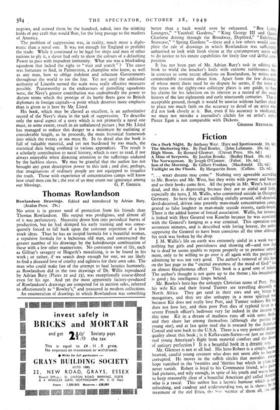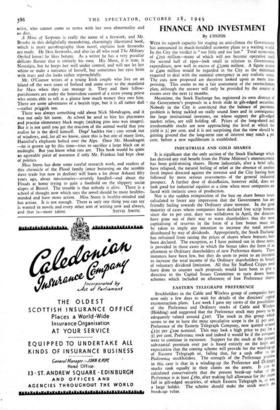Fiction
". . WHAT dreams may come." Nothing very agreeable according to Mr. Bowles and Mr. West, but they write with power and beauty and so their books come first. All the people in Mr. West's book are dead, and this is depressing because they are so sinful and lively, especially the hero, J. M. Wallis, who committed suicide in Occupied Germany. So here they all are milling sinfully around, self-deceived, devil-deceived, driven into patently man-made concentration camps, geared to false laughter in man-made seaside resorts, earth-bound. There is the added horror of forced association. Wallis, for instance, is linked with Herr General von Kenelm because he was associats1 with the General's hanging as a war criminal. This operation took seventeen minutes, and is described with loving horror, the audio supposing the General to have been conscious all the time althoug his neck was broken by the drop. J. M. Wallis's life on earth was extremely sinful in a weak way nothing but girls and peevishness and showing off—and now tha' he is dead he seems unable to repent properly or to promise amend ment, only to be willing to go over it all again with the purpose admitting he was not very good. The author's removal of this her on the last page to the " eternal awareness of the mind of God" ha an almost blasphemous effect This book is a good sort of failure The author's thought is not quite up to the theme ; his imaginau is good ; his intelligence limps behind. Mr. Bowles's hero has the unhappy Christian name of Port. Port his wife Kit and their friend Tunner are travelling dreamily I North Africa. They get sand in their ears and are bitten b mosquitoes, and they are also unhappy in a more spiritual ritual va because Kit does not really love Port, and Tunner seduces Kit ha
i
does not love her, and then poor Port dies of typhoid fever n severe French officer's bedroom very far indeed in the interior b this time. Kit in a dream of madness runs off with some Ara and they share her among themselves (although she preters. young one), and at last quite mad she is rescued by the Amerri Consul and sent back to the U.S.A. There is a very powerful dream quality about this book ; is it Kafka-cum-Sartre--or just an intelle. tual young American's flight from material comfort and the d of sanitary perfection ? It is a beautiful book in a dreamy way. Mr. Glemser is not at all bad. His hero Robert is a simple, warn' hearted, candid young creature who does not seem able to bee, corrupted. He moves in the raffish circles that moralist, Ia•3 hope vanished in the 'twenties and 'thirties but which in plain f never vanish. Robert is loyal to his Communist friend, who P bad pictures, and wily enough, in spite of his youth and warm h to keep reasonably clear of a beautiful American girl called }lever' who is a rascal. This author has a lacon:c humour which is V refreshing, and candour and understanding too, as is shown b) treatment of the airl Erica, di! hls' ',linter of them all, the
artist, who cannot come to terms with her own abnormality and so dies.
A Mine of Serpents is really the name of a firework, and Mr. Brooke in this delightfully meandering, charmingly illustrated book, which is more autobiography than novel, explains hoiv fireworks are made. He likes fireworks, and also (as all who read The Military Orchid know) he likes botany. As a writer he has a very peculiar delicate flavour that is entirely his own. His Musc, it is true, is Nostalgia, but he keeps her well under control, and will not let her whine or make a nuisance of herself, but sometimes her eyes brim with tears and she looks rather reproachfully.
Mr. O'Connor writes of a young Irish couple who live on an Island off the west coast of Ireland and come over to the mainland for Mass when they can manage it. They and their fellow- parishioners are under the benevolent control of a stern young priest who seems able to tell at a glance how much money they owe him. There are some adventures of a boyish type, but it is all rather dull —rather priggish too.
There was always something odd about Nick Mondragon, and it was not only his name. At school he used to bite his playmates and practise elementary black magic (sticking pins into wax images). But it is not until you get the reaction of the animal world that you realise he is the devil himself. Dogs' hackles rise ; cats streak out of windows, and, for all we know, since this is but one of many lives, Hannibal's elephants bolted over the Alps. Once Mr. Mondragon --he is grown up by this time—tries to sacrifice a large black cat at midnight. But you know what cats are. This book would be quite an agreeable piece of nonsense if only Mr. Frankau had kept clear of politics.
Miss Steen has done some careful research work, and readers of this chronicle of the Flood family (once battening on the terrible slave trade but now in decline) will learn a lot about Ashanti fifty years ago, about missionaries—severely handled—and about the Floods at home trying to gain a foothold on the slippery social slopes of Bristol. The trouble is that nobody is alive. There is a school of thought now which says the novel should be more healthy- minded and have more action. Miss Steen is healthy-minded and has action. It is not enough. There is only one thing you can say is wanted in novels and every other sort of writing now and always,







































 Previous page
Previous page